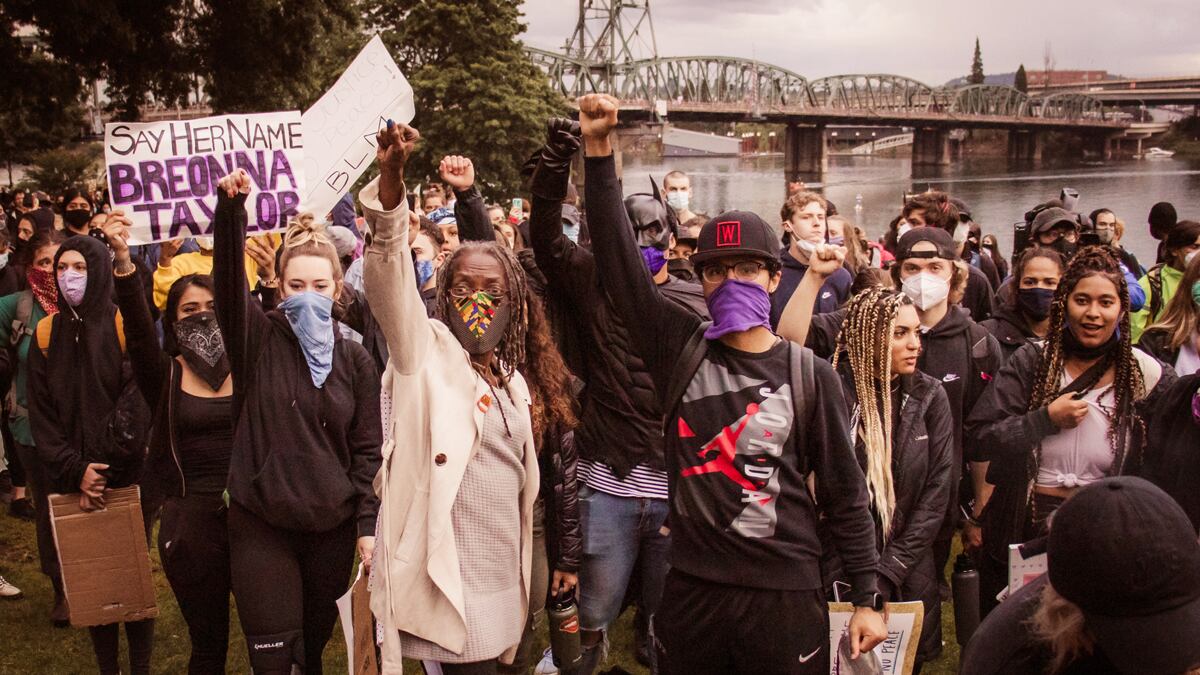On June 10, the Portland City Council will vote to defund the police—or at least a specific portion of the police.
Mayor Ted Wheeler on June 9 acceded to demands from City Commissioner Jo Ann Hardesty and others that Portland dissolve a unit of the Portland Police Bureau called the Gun Violence Reduction Team. Wheeler said the council would take that step and shift $12 million from police and other bureaus to new programs benefiting people of color. "We can't do this incrementally," Wheeler said. "We must do it through bold actions."
The mayor's concession was an historic achievement for protesters who have jammed city streets every night for nearly two weeks. For this uprising to succeed so swiftly in defunding a police unit demonstrates its power and urgency. "With COVID-19, people are risking their lives to demand change," says Kayse Jama, executive director of Unite Oregon. "That's how much the people are angry and frustrated."
But the decision to eliminate the Gun Violence Reduction Team, which includes about 35 officers, did not emerge overnight. It was also the result of a yearslong campaign by Hardesty—who recognized this moment as an opportunity.
Hardesty told protesters June 5 they had given her the leverage she needed. "For 15 years, I was banging my head against the walls of City Hall," she said. "I did not have those three votes to remove [police] units. Until you."
The details of reallocating police funding and reassigning officers were still being hashed out at press deadline, and remain the subject of intense negotiations among city commissioners. But the basic concept Hardesty champions is elegant in its simplicity. It has two parts:
Defund the Gun Violence Reduction Team. Since long before she was elected in 2018, Commissioner Hardesty had her eye on disbanding a unit of the Portland Police Bureau that used to be called the Gang Enforcement Team but is now the Gun Violence Reduction Team. Hardesty and other critics say GET and now GVRT disproportionately focus on young black men. In a waterfront speech to protesters June 5, Hardesty told the crowd that 52 percent of GVRT stops involved blacks, who make up just 6 percent of Portland's population. "That makes no sense," Hardesty said. She tried, without success, to defund GVRT in May 2019, shortly after arriving in office. Her effort led to public sparring on the council dais with Wheeler, who defended the team's work and disparaged Hardesty and Commissioner Chloe Eudaly for using its old name. He immediately apologized, but the exchange displayed how raw feelings are surrounding GVRT.
Give the money to Portland Street Response. Hardesty and Wheeler teamed up last year to persuade the City Council to invest in a two-employee pilot program in Lents called Portland Street Response. Collectively, the Portland Police Bureau and Portland Fire & Rescue respond to more than 300,000 calls a year, most of which involve neither a serious crime, a fire, nor a medical emergency. Portland Street Response borrows from a nationally lauded program in Eugene that sends a community health worker and an emergency medical technician, rather than sworn public safety officers, to routine calls. The idea is to dispatch more appropriate personnel who can meet 911 callers' needs more effectively and cheaply—without the conflict that sometimes occurs when armed officers respond. "I've received more than 12,000 emails in support of this agenda," Hardesty told the crowd last week. "We're going to win this!" In his announcement that GVRT was finished, Wheeler said Tuesday it was too early to say whether Portland Street Response would benefit. "I am a strong advocate and am very hopeful this will lead to more money for Portland Street Response," Wheeler said. "[But] we have not specifically prescribed where money will go."


